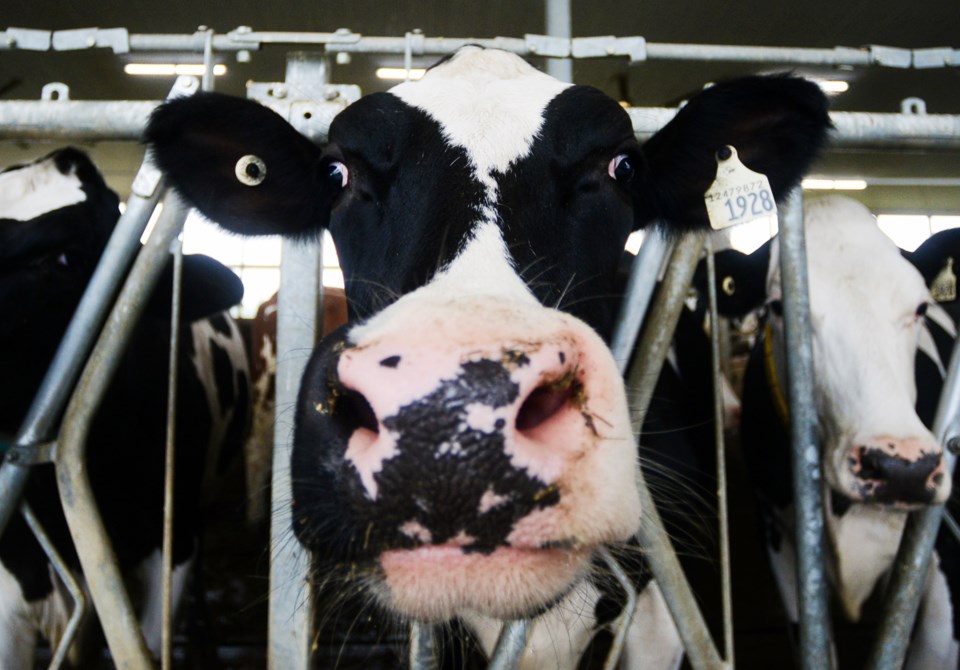Efforts to improve farm sustainability and herd health recently received a $4 million boost.
Doctors Stephen David Kelton, David Renaud and Stephen LeBlanc from the department of population medicine at the Ontario Veterinary College will research the challenges facing dairy producers today.
Funding in the amount of $2.6 million was received from the Natural Sciences and Engineering Research Council (NSERC) Alliance program, which supports research collaborations with partner organizations on projects that have real-world impact for Canadians.
Industry collaborators include Dairy Farmers of Ontario (DFO), Dairy Farmers of Canada (DFC), Lactanet and Veal Farmers of Ontario, who are all providing a further $1.3 million in funding and in-kind support.
“Collaborative research with dairy and veal farmers is a win-win. Our research team has worked closely with our industry partners to target the questions for which producers need science-based answers,” said LeBlanc in a news release announcing the funding.
“The collaboration is very important. All of the work that we are doing addresses research priorities set by dairy farmers.”
The project responds to several priorities identified in the 2022–2027 National Dairy Research Strategy.
The strategy was developed by DFC and its provincial partner organizations, such as DFO, to guide and support research that benefits Canada’s dairy producers and addresses their current and future concerns.
“Dairy farmers set out a list of priorities. So we work with this looking at what we can address that really isn’t being addressed by others. So its responsive, a true-leverage partnership.”
Murray Sherk, board chair at Dairy Farmers of Ontario, says innovation requires collaboration and partnership.
“We are proud to contribute to this important body of research. Dairy producers are early adopters when it comes to on-farm efficiencies so partnering on research initiatives that address challenges is vital to the sustainability of our industry,” Sherk said.
There will be 15 studies done with a focus on two key themes – mitigating infectious disease and supporting sustainable milk production.
“Biologically and economically, the goal is for a cow to have a calf once every 12 months,” LeBlanc said.
Researchers will work with farmers to improve reproductive health of dairy cows and optimize reproductive management using activity monitors.
“Dairy cows are referred to as being ‘metabolic athletes’, so they are just like high performance athletes. Having them keep up their fertility is a challenge as it is for human high-performance athletes. One of the projects is to optimize the use of activity monitors. More and more cows are wearing ‘cow equivalent of Fit Bits’.
With more research LeBlanc hopes to take the ‘cow Fit Bit’ up a notch to enhance how they perform.
“The goal is to optimize fertility and even hopefully predict it, and to be more strategic so cows can be fertile on their own,” LeBlanc said.
“On average, dairy farmers can achieve quite good reproductive performance using these Fit Bits but of course there is variation between farms.”
The team also hopes to learn about transmission of bovine leukosis, an endemic disease, and salmonella dublin, an emerging concern for the Canadian cattle industry.
LeBlanc says this foundational knowledge will help the team develop better-informed control methods which they will test with commercial dairy herds.
Other studies will identify the barriers for dairy farmers in implementing evidence-based best management practices and provide them with Canada-specific economic models to support their decision-making in reproductive management.
“We are doing rigorous research with this funding, so we’ll publish and present papers with our findings and train students and post-doctoral researchers,” said LeBlanc.
“But a critical measure of the project’s success will be implementation of the results, recommendations and tools that we put into the hands of Canadian dairy farmers.”
Projects will take place at about 90 farms across the country where data will be collected including information about a cow’s health and performance.
“Much of the research will be done out on commercial farms,” LeBlanc said.
“Some will be done at the university research farm, but most of it will be done in real world conditions. That will keep results accessible and practicable for dairy and veal farmers.”
Guelph MP Lloyd Longfield says NSERC Alliance funding is vital to empowering universities and community organizations to create new research and knowledge that directly benefits Canadians.
“The funding announced today for the Ontario Veterinary College will continue to support and strengthen dairy and veal production in Canada,” he said in the news release.



